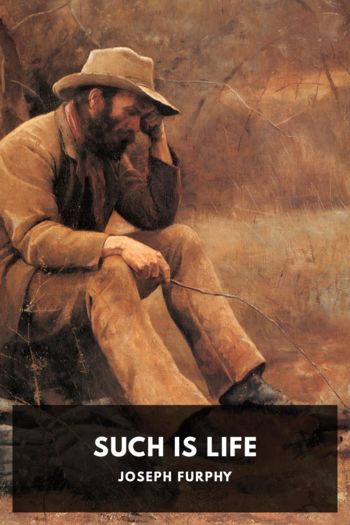Such Is Life, Joseph Furphy [online e book reading txt] 📗

- Author: Joseph Furphy
Book online «Such Is Life, Joseph Furphy [online e book reading txt] 📗». Author Joseph Furphy
“I knows wun respectable man with two teams wot’s seed the time he’d emp’y a double-barr’ll gun on them two fellers jis’ same’s if they was wild dogs,” remarked Price ominously. “I happen ter mind me o’ wun time this man hed ter fetch hees las’ wool right on ter Deniliquin, f’m Hay, f’r two-five hextry, ’count o’ there bein’ no river that season. An’ that man ’e war shaddered hevery day acrost Wo-Winyar, an’ hees bullicks collared hevery night with Bob or Bat; an’ them bullicks har’ly fit ter crawl with fair poverty. Dirty! W’y, Chows ain’t in it with them varmin f’r dirtiness.” Here followed a steady torrent of red vituperation, showing that Price took a strong personal interest in the respectable man with the two teams.
“To my (adj.) knowledge, they dummied land for ole M’Gregor, an’ never got a cent for it,” remarked Dixon. “Same time, I got nothin’ to say agen ’em, for they never got a slant to snavel my lot. Brothers—ain’t they?”
“No (adj.) fear,” replied Mosey. “You never seen brothers hangin’ together like them chaps. I know some drovers that’s been prayin’ for theyre (adj.) souls every night for years, on account o’ the way they used to rush travellin’ stock across M’Gregor’s runs. Whenever there was dirty work to be did, them two blokes was on hand to do it. An’ I got it on good authority that they chanced three years chokey for perjury, when they was dummyin’ for M’Gregor; an’ all they got for it was the fright hangin’ over them. A man shouldn’t make a dog of his self without he’s well paid for it. That’s my (adj.) religion.”
“So far as dummying is concerned.” said I; “no one except their Maker and M’Gregor knows how the thing was worked. But if they had owned all the land they secured for M’Gregor, by perjury, and personation, and straightforward dummyism, they would have been little squatters themselves. At the same time, they were truehearted, kindly, unselfish men, according to their uncertain light; and in all probability they’re gone to heaven. Such is life, boys.”
“Anyhow, they ain’t goin’ to trouble us no furder,” rejoined Mosey complacently. “Theyre toes is turned up. Lis’n!—that’s the sound I like to hear!” The sound was the deep, heavy sough of a contented bullock, as he lay down with a couple of days’ rations in his capacious first stomach.
“Grass is generally a burning question with you teamsters,” observed Willoughby.
“I never make no insinuations, myself,” replied Dixon coldly.
“Good!” interjected Mosey. “If you was inclined that road, you might say the carrier’s got as much interest in the grass as a squatter. It’s the traveller as don’t give a (compound expletive) if the whole country’s as black as Ole Nick’s soot-brush.”
“Well, I s’pose that’s about a fair thing for tonight,” remarked Cooper; and he pulled off his boots, preparatory to wrapping himself in his blanket. “Time to vong tong cooshey, as the Frenchman says. Mustn’t oversleep in the mornin’, if the place is ever so safe.”
Then I disposed my possum rug and saddle, took off my boots, spread my coat for Pup to sleep on, lit my pipe, and lay down for the night. Thompson, Mosey, and Willoughby arranged themselves here and there, according to taste. Dixon and Methuselah retired to hammocks under the rear of their respective wagons. Bum simply lay where he was. I would do my companions what honour I can, but the stern code of the chronicler permits no quibbling with the fact that Mosey and Bum wound up the evening with a series of gestes and apothegms, such as must not tarnish these pages—Willoughby occasionally taking part, rather, I think, through courtesy than sympathy, and ably closing the service with a fescennine anecdote, beginning, “It is related that, on one occasion, the late Marquis of Waterford—”
Willoughby had selected a smooth place near my own lair. Here he spent five minutes in spreading his exceptionally dirty blanket, and another five in tidily folding his ragged coat for a pillow. Then he removed his unmatched boots, and, unlapping from his feet the inexpensive substitute for socks known as “prince-alberts,” he artistically spread the redolent swaths across his boots to receive the needed benefit of the night air; performing all these little offices with an unconscious elegance amusing to notice—an elegance which not another member of our party could have achieved, any more than Willoughby could have acquired the practical effectiveness of a good rough average vulgarian.
Poor shadow of departed exclusiveness!—lying there, with none so poor to do him reverence! He was a type—and, by reason of his happy temperament, an exceedingly favourable type—of the “gentleman,” shifting for himself under normal conditions of back-country life. Urbane address, faultless syntax, even that good part which shall not be taken away, namely, the calm consciousness of inherent superiority, are of little use here. And yet your Australian novelist finds no inconsistency in placing the bookish student, or the city dandy, many degrees above the bushman, or the digger, or the pioneer, in vocations which have been the lifework of the latter. O, the wearisome nonsense of this kind which is remorselessly thrust upon a docile public! And





Comments (0)